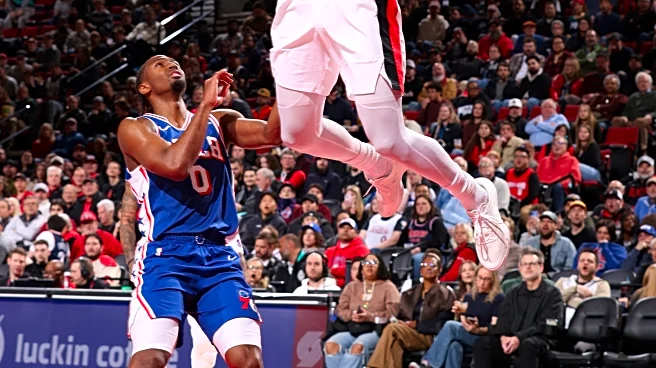What's Happening?
The Buffalo Bills are exploring options to enhance their linebacker lineup for the 2026 season. With current linebackers Dorian Williams and Terrel Bernard under contract, the team is unlikely to retain
Matt Milano due to recurring injury issues. Roquan Smith, a star defender from the Baltimore Ravens, has been identified as a potential trade candidate. The Ravens might consider trading Smith to save cap space, especially if younger players like Teddye Buchanan and Trenton Simpson can fill the void. Smith's performance has been notable, with Pro Football Focus grades of 65.5 in run defense and 70.9 in coverage this season. However, his $100 million contract poses a challenge for the Bills, who are projected to be over the cap by $4 million in 2026.
Why It's Important?
The potential acquisition of Roquan Smith by the Buffalo Bills could significantly bolster their defense, addressing a key area of need. Smith's versatile skill set would enhance the team's ability to defend against both the run and pass. For the Ravens, trading Smith could alleviate financial pressures and allow them to invest in developing younger talent. The move could also impact the dynamics of the AFC, as the Bills aim to strengthen their roster to compete more effectively. The financial implications for both teams are substantial, with the Bills needing to navigate cap space constraints and the Ravens potentially freeing up resources for other strategic investments.
What's Next?
If the trade proceeds, the Buffalo Bills will need to creatively manage their salary cap to accommodate Smith's contract. The Ravens will likely focus on developing Buchanan and Simpson to ensure a smooth transition in their defensive lineup. Fans and analysts will be watching closely to see how these moves affect team performance and strategy in the upcoming season. The trade could also prompt other teams to reassess their rosters and consider similar strategic adjustments.
Beyond the Headlines
The potential trade of Roquan Smith highlights the ongoing challenges NFL teams face in balancing talent acquisition with financial management. It underscores the importance of developing young players who can step into key roles, allowing teams to make strategic trades that benefit their long-term goals. The situation also reflects broader trends in the league, where financial considerations increasingly influence player movement and team composition.










